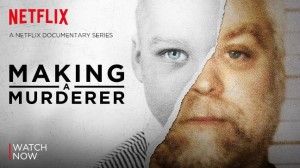
A small group of BYU students gather on a cold winter night to discuss their opinions of the latest controversial Netflix show: Making a Murderer. This debated documentary was first aired on Netflix on Dec. 18, 2015, and has become one of the hottest topics around campus.
Making a Murderer is a 10 episode documentary depicting the story of Steven Avery, a Manitowoc County, Wisconsin, resident who served 18 years in prison for the sexual assault and attempted murder of Penny Beernsten before being exonerated in 2003. Two years later, Avery was arrested and in 2007, he was convicted of a separate murder of a local photographer, Teresa Halbach.
“One of the reasons why I think it’s so popular (is) you can’t say conclusively one way or another,” said criminal defense attorney and former BYU law student J.P. Brummer. “You can’t say conclusively that he is guilty and you can’t say conclusively that he is innocent.”
The series presents the information and facts to illustrate flaws in the legal system and to tell this man’s story. However, some BYU students say it is one-sided and biased. BYU law student Meg Krivanec feels that it was no fault of the producers, but the defense was not interviewed, so their side was not presented.
Another reason why this documentary has become so popular is the timing of its premiere. Students from all over the country spread the word about this scandalous show, and with the Christmas break arriving at the time of the premiere, students were able to binge-watch the entire series.

“I had lots of friends from my law school that talked to me about it over break, so I thought ‘Hey, I should figure out what that is,'” Krivanec said.
“Honestly, the hype had me so intrigued,” BYU senior Kyle Robinson said. “And the fact that it got such good ratings. I started it on Saturday and now four days later I am on episode eight.”
But the argument has continued over whether this man has been wrongfully convicted or not.
“In order for someone to be convicted of the crime, there has to be enough evidence that they are guilty beyond a reasonable doubt,” Brummer said. “Most people hesitate to quantify that, you have to be 70 to 90 percent sure the person is guilty before the person can be convicted. So I’m not positive that he did, if I was asked to bet my house on it I would say he is guilty. But I’m only 50 percent sure, so I don’t think there was enough evidence for him to be convicted of the crime.”
A common complaint among student watchers is its length. Most agree the producers could have cut the number of episodes nearly in half and would have still been able to present the important information.
“I really liked it and thought it was really well-made,” said Claire Gillett, a BYU freshman. “But, I feel like you could watch the first two episodes and the last two episodes and still get the main ideas.”
Students are also amazed and disillusioned by the alleged flaws in the justice system.
“It informed me that rural courts and rural prejudices played such a huge role in the justice system,” Brummer said. “Not recently, but mostly in the past, where people were wrongfully convicted. It often happens in small towns where everyone knows the story before they are selected as jurors, so they already have preconceived notions and prejudices. There is a lot of respect for district attorneys and the defense.”
Krivanec realized from watching the show that a poor defense or police with personal agendas can possibly corrupt the system.
“It just goes to show why ethics are important,” Krivanec said.
The Making a Murderer series continues to be featured on Netflix.




